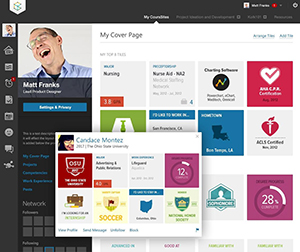Learner-Centric Shifts in Education
Published by: WCET | 10/1/2014
Tags: Practice
Published by: WCET | 10/1/2014
Tags: Practice
Katie Blot, senior vice president, education services at Blackboard shares with us how MyEdu is helping learners succeed through academic planning and out into the marketplace.
When we talk about changes in education, the best place to start is with the learner. And if there’s one statistic that highlights the shift in who our learners are, it could be this: today less than 15 percent of higher education students in the U.S. are what we would call “traditional” 4-year residential students. That means that there are roughly 18 million post-traditional students who are over 25, need to work to afford education, attend multiple institutions, have dependents, and are actively working toward job and career goals.
Even “traditional” undergraduates are seeking flexibility and transparency in their educational options (online, self-paced, dual enrollment, accelerated degrees, competency based learning, etc.), such that the old distinctions between “traditional” and “non-traditional” are not really applicable anymore. Post-traditional students do not fit in clearly defined categories, and they follow extremely varied educational pathways.
Economics Make Students More Focused on Their Goals
These shifts are driven in part by economics. The need for higher education opportunities is greater than ever before, as increasingly jobs require post-secondary education. Research repeatedly emphasizes that higher education leads to greater economic attainment, both for individuals and for our country. But with the recession and the rise in the cost of higher education, degree attainment is extremely difficult for many people to afford. Potential students are looking for a more economical means to access upward mobility and are accelerating huge consumer-driven changes in higher education.
Students today are much more focused on establishing a clear-cut career path and figuring out which job is going to help them earn a living and eventually pay for or justify the cost of their education. This leads to a focus on the competencies they’ll gain from their education and how they can demonstrate those competencies to prospective employers and translate them into gainful employment.
What Do College and University Presidents Foresee? It’s Not Always Positive.
Naturally, these shifts in learner behavior put significant pressure on our institutions. But educational institutions, even in their own estimation, are not adapting quickly enough. Our recent research co-sponsored by The Chronicle of Higher Education gathered insights from over 350 college and university presidents on the topics of change and innovation in higher education.
How will we approach systemic educational changes? We’ve been talking for a while about mobile, personal, and flexible – but that is not enough. Now we need to add affordable, modular, and accessible. The learning ecosystems that serve these needs empower students to:
MyEdu: A New Academic Planning Tool
 One example of how Blackboard is helping learners succeed is MyEdu. MyEdu offers free, learner-centric academic planning tools, including a personal education planner, a flexible scheduler and an assignment tracker. By consolidating multiple components into a rich, easy-to-use platform, MyEdu helps students plan their degree path, take the right classes, and stay on track to graduate on time. MyEdu also presents students with up-to-date information about courses, schedules, and professors as well as feedback from other students.
One example of how Blackboard is helping learners succeed is MyEdu. MyEdu offers free, learner-centric academic planning tools, including a personal education planner, a flexible scheduler and an assignment tracker. By consolidating multiple components into a rich, easy-to-use platform, MyEdu helps students plan their degree path, take the right classes, and stay on track to graduate on time. MyEdu also presents students with up-to-date information about courses, schedules, and professors as well as feedback from other students.
MyEdu helps learners establish their professional profiles. The traditional resume doesn’t accurately represent the skills and talents of learners, and tools that work for mid-career professionals don’t effectively convey a student’s credentials, capabilities, and evidence of learning. As students use MyEdu’s academic tools, they build their professional profiles with data about their school, major, courses, graduation date and academic work. They can also personalize their profiles with credentials, projects, organizations, services, languages, work experiences and competencies, providing valuable information to employers.
And perhaps most importantly, MyEdu connects learners with employers and jobs. Learners choose how much and what type of information from their profiles to show to employers for potential jobs and internships. By connecting the learning achievements from their courses and projects with lifelong, cross-institutional learning profiles, these achievements and their related competencies become more powerful for helping learners succeed in their goals of completing their degrees, getting jobs, and advancing their careers. MyEdu empowers learners to recognize, manage and continuously build on their own recognizable achievements beyond any single course, program, degree, or institution.
MyEdu enables employers to connect directly to students whose data indicates that they would be a great match for open positions. They can see not only courses and credits, but also much more granular achievements that reveal who the student is and what specific talents they can bring to the job. These are very concrete ways in which new technologies and evolving learning ecosystems serve post-traditional learners.
It’s not just about jobs—it’s the new normal of evolving careers and the need for lifelong learning. Today’s learners need to build skills and work toward credentials at any time, at any age and apply them to an ever-changing landscape of personal goals. Today’s evolutions in our learning ecosystems coincide with the rise in learners’ need to have more control over their own learning achievements.
 Katie Blot
Katie Blot
Senior Vice President
Education Services
Blackboard
katieblot@blackboard.com